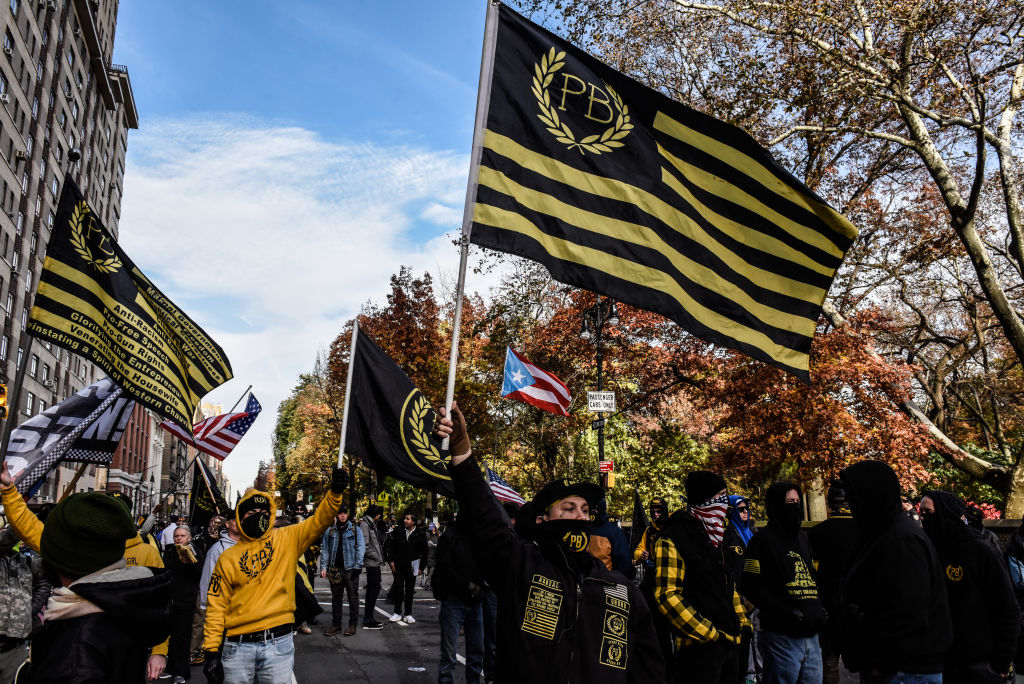How the Proud Boys are 'quietly' working to bring their 'menacing politics' to the local level


A free daily email with the biggest news stories of the day – and the best features from TheWeek.com
You are now subscribed
Your newsletter sign-up was successful
Far-right nationalists the Proud Boys have begun bringing "their brand of menacing politics to the local level," as members have "increasingly appeared in recent months at town council gatherings, school board presentations and health department question-and-answer sessions across the country," reports The New York Times.
In November, members showed up outside a school board building in Wisconsin to protest mask requirements; some were spotted at a school board meeting in North Carolina just days later, right before a vote on a mask mandate. Others even attended a gathering in Illinois, "where parents were trying to remove a nonbinary author's graphic novel from public school libraries," writes the Times.
For some time, Proud Boys were known more for their national profile; but since the disaster that was Jan. 6, the group has moved away from the national spotlight and "quietly shifted" its attention toward expanding local chapters, according to members and researchers.
The Week
Escape your echo chamber. Get the facts behind the news, plus analysis from multiple perspectives.

Sign up for The Week's Free Newsletters
From our morning news briefing to a weekly Good News Newsletter, get the best of The Week delivered directly to your inbox.
From our morning news briefing to a weekly Good News Newsletter, get the best of The Week delivered directly to your inbox.
"The plan of attack if you want to make change is to get involved at the local level," member Jeremy Bertino told the Times.
"We've seen these groups adopt new tactics in the wake of Jan. 6, which have enabled them to regroup and reorganize themselves," added Jared Holt, who researches domestic extremist groups. "One of the most successful tactics they've used is decentralizing."
And as local chapters have flourished, members have "increased their radical tendencies," Holt explained, considering participants feel more comfortable sharing problematic beliefs in smaller groups. Read more at The New York Times.
A free daily email with the biggest news stories of the day – and the best features from TheWeek.com
Brigid Kennedy worked at The Week from 2021 to 2023 as a staff writer, junior editor and then story editor, with an interest in U.S. politics, the economy and the music industry.
-
 How Democrats are turning DOJ lemons into partisan lemonade
How Democrats are turning DOJ lemons into partisan lemonadeTODAY’S BIG QUESTION As the Trump administration continues to try — and fail — at indicting its political enemies, Democratic lawmakers have begun seizing the moment for themselves
-
 ICE’s new targets post-Minnesota retreat
ICE’s new targets post-Minnesota retreatIn the Spotlight Several cities are reportedly on ICE’s list for immigration crackdowns
-
 ‘Those rights don’t exist to protect criminals’
‘Those rights don’t exist to protect criminals’Instant Opinion Opinion, comment and editorials of the day
-
 Key Bangladesh election returns old guard to power
Key Bangladesh election returns old guard to powerSpeed Read The Bangladesh Nationalist Party claimed a decisive victory
-
 Epstein files topple law CEO, roil UK government
Epstein files topple law CEO, roil UK governmentSpeed Read Peter Mandelson, Britain’s former ambassador to the US, is caught up in the scandal
-
 Iran and US prepare to meet after skirmishes
Iran and US prepare to meet after skirmishesSpeed Read The incident comes amid heightened tensions in the Middle East
-
 EU and India clinch trade pact amid US tariff war
EU and India clinch trade pact amid US tariff warSpeed Read The agreement will slash tariffs on most goods over the next decade
-
 Israel retrieves final hostage’s body from Gaza
Israel retrieves final hostage’s body from GazaSpeed Read The 24-year-old police officer was killed during the initial Hamas attack
-
 China’s Xi targets top general in growing purge
China’s Xi targets top general in growing purgeSpeed Read Zhang Youxia is being investigated over ‘grave violations’ of the law
-
 Panama and Canada are negotiating over a crucial copper mine
Panama and Canada are negotiating over a crucial copper mineIn the Spotlight Panama is set to make a final decision on the mine this summer
-
 Why Greenland’s natural resources are nearly impossible to mine
Why Greenland’s natural resources are nearly impossible to mineThe Explainer The country’s natural landscape makes the task extremely difficult
